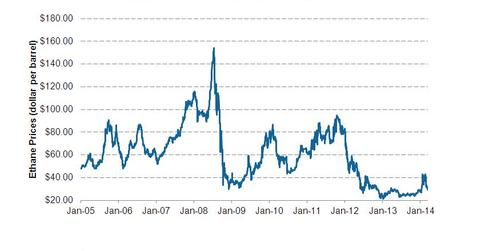Ethane production and its effects on natural gas processors
With attractive NGL pricing relative to naphtha refinery streams, the feedstock percentage of NGLs has been increasing, with ethane taking a disproportionate share of the total.
April 14 2014, Published 9:00 a.m. ET

Natural gas processors
Natural gas processors or midstream companies take raw natural gas, delivered by upstream oil and gas producers, to a natural gas processing plant. Here, they clean out its impurities, separate it into multiple components (dry natural gas and various natural gas liquids, including ethane), and sell the components.
Ethane demand is highly dependent on the North American petrochemical industry, which consumes virtually all of the ethane produced in the U.S. With attractive NGL pricing relative to naphtha refinery streams, the feedstock percentage of NGLs has been increasing, with ethane taking a disproportionate share of the total. Most U.S. ethylene crackers are running at maximum ethane volumes.
MarkWest Energy Partners (MWE), a master limited partnership engaged in the gathering, processing, and transportation of natural gas and NGLs, commenced operations of two large scale de-ethanization facilities in 2013. Each of these units, with capacity of 38,000 barrels per day, is connected by a purity ethane pipeline. The units support deliveries of purity ethane into two downstream pipelines, one of which is Sunoco Logistics Partners, L.P.’s (SXL) pipeline to the Ontario, Canada markets. Due to increased natural gas production from the liquids-rich area of the Marcellus Shale, natural gas processors must begin to recover a significant amount of ethane from the gas stream to meet the pipeline gas quality specifications for residue gas and to allow for the ability to benefit from any potential price uplift received from the sale of ethane. MWE is also constructing a 40,000 barrel-per-day de-ethanization unit, at the Cadiz Complex that is expected to commence operation in the second quarter of 2014. The de-ethanization facilities will provide the gas producers at Marcellus, access to all of the ethane pipeline projects in the Northeast. This will enable the producers to meet their downstream obligations to deliver purity ethane.
The table below is MWE’s current situation and future plans regarding de-ethanization facilities, which are expected to be connected by a network of purity ethane pipelines.
Williams Partners L.P. (WPZ), which primarily engages in midstream gathering and processing businesses and NGL and natural gas marketing business, has total production capacity of 1.35 billion pounds of ethylene and 90 million pounds of propylene per year. During most of 2013, WPZ reduced its recoveries of ethane in its plants, which resulted in 31% lower NGL production volumes compared to 2012. NGL margins were approximately 40% lower in 2013 compared to 2012 driven by reduced ethane recoveries. In fact, lower NGL prices and higher natural gas prices actually led to ethane rejection as the economies of producing NGLs like ethane or propane were absent for WPZ.
There are several different methods under which natural gas processors are paid for their services. Under one method, called a “keep-whole” contract, processors retain some or all of the natural gas liquids extracted as compensation and replace the energy content of the retained NGLs with natural gas purchases. Under this scenario, processors are inherently long natural gas liquids and short natural gas. So, low ethane prices hurt these companies’ margins. One way to keep track (at least directionally) of the profitability of natural gas processors with keep-whole contracts is through fractionation spreads (also called “frac spreads”).
Companies in the natural gas processing space (many of which are master limited partnerships) keep an eye on the fractionation or “frac” spread, which is a measure in the difference between natural gas liquids prices and natural gas prices and a rough measure of gas processing economics.
If ethane gets too cheap, it can become uneconomic to remove it from the raw natural gas stream, and the decision to leave ethane in the raw natural gas stream is called “ethane rejection.” Cheap ethane can reduce the revenues for processors with commodity-sensitive contracts. NGLs are also generally worth more as separate components as prices for NGLs are mostly higher than that of natural gas on an energy equivalent basis.
According to Enterprise Products Partners (EPD), a significant part of natural gas liquids production is ethane (~45%). According to EIA, total gas plant production of ethane-ethyleme has fallen to ~1.0 million barrels per day in January 2014 from 0.9 million barrels a day produced a year ago. Production costs and margins based on purity ethane are more important to most ethylene producers than any other NGL-based feeds since ethane accounted for 70% to 73% of the U.S. ethylene production in the second half of 2013. So ethane is structurally oversupplied in the U.S. market and could benefit from exports. Note that ethane is more difficult to export than propane and butane (the LPGs) due to its chemical properties.
Frac spreads have fallen from highs reached in January 2014, which have negatively affected the earnings of some natural gas processors such as Williams Partners (WPZ), Targa Natural Resources (NGLS), Regency Energy (RGP), and DCP Midstream (DPM), which are all components of the Alerian MLP ETF (AMLP).
In this series, we will discuss some of the factors that have caused ethane rejection, and what the major supply and demand factors for ethane are. Continue to read about EPD’s exports of NGL in the next part of this series.
